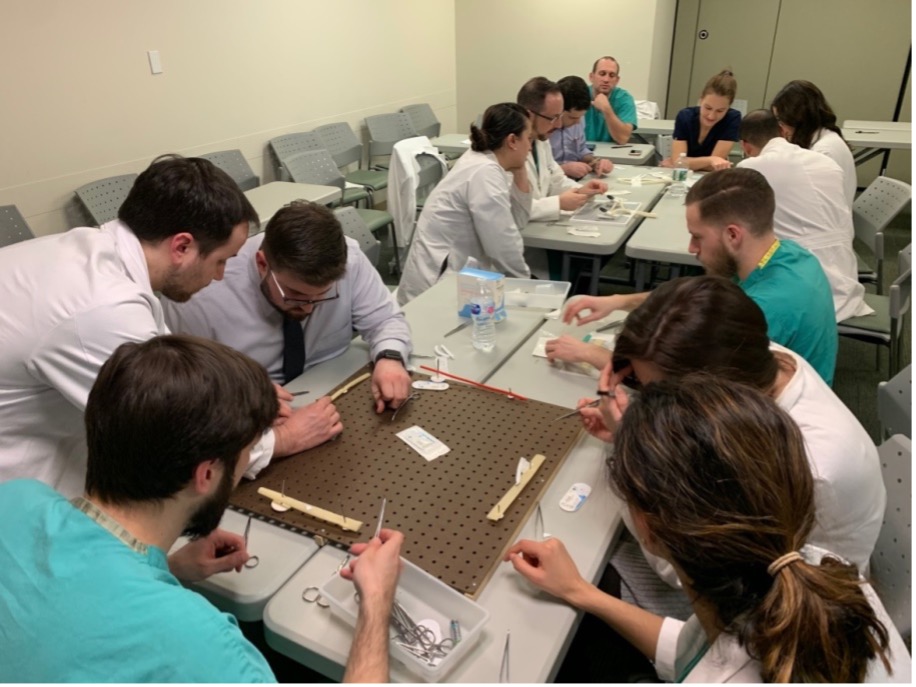Educational Curriculum
- font size decrease font size increase font size
The program will provide residents the opportunity to learn the scientific and clinical principles of surgery while providing care to a diverse and underserved population in a community hospital setting. The program will provide residents the opportunity to learn the basic sciences as applied to clinical surgery.
We provide an experience in preoperative, operative and postoperative care for patients in all areas that constitute the principles of general surgery (head and neck, breast, skin/soft tissue, alimentary, abdominal, vascular, endocrine, trauma and surgical critical care, and minimally invasive surgery). Experience in additional areas (e.g cardiothoracic, plastics, pediatrics, anesthesia, orthopedics, urology, neurosurgery, endoscopy, and robotics) will also be offered.
The program is five years in duration. The central three years are dedicated to experience the components of general and subspecialty surgery. The chief year will be committed to the main components of general surgery. The program will teach critical-thinking skills, evaluation of data, technical skills and the care of patients who do not require surgery.
Residents will have the opportunity to maintain continuity of care for their patients. The program will provide an adequate number and variety of cases as determined by the ACGME for achieving a strong foundation of operative skills and surgical judgment. Educational conferences will also be afforded to enhance the acquisition of knowledge and technical skills.
The surgery residency follows the curriculum outlined by SCORE, which is designed to provide residents with high-quality educational materials and a structured program for self-learning in all areas of general surgery and related specialties. All residents are expected to study the weekly reading material. The assignments are to be completed prior to attending the weekly protected time conference.
|
|
CURRICULUM |
|
|
|
LEVEL |
SPECIALTY |
LENGTH |
|
|
PGY-1 |
General Surgery* |
7 months |
|
|
Surgical SICU |
1 months |
||
|
Trauma |
2 months |
||
|
Wayne |
2 months |
||
|
PGY-2 |
General Surgery* |
5 months |
|
|
Surgical ICU |
3 month |
||
|
Trauma |
2 months |
||
|
Wayne |
2 months |
||
|
PGY-3 |
General Surgery* |
8 months |
|
|
Wayne |
2 months |
||
|
Transplant- University Hospital NJMS |
1 month |
||
|
Elective |
1 month |
||
|
PGY-4 |
General Surgery* |
9 months |
|
|
Trauma |
2 month |
||
|
Elective |
1 months |
||
|
PGY-5 |
General Surgery* |
12 months |
* General Surgery SJUMC includes: General, acute care, MIS, robotic, endocrine, colorectal, endoscopy, surgical oncology, abdomen, vascular, bariatric, head & neck, skin soft tissue& breast, thoracic, pediatric procedures, alimentary tract, and hepatobiliary/pancreatic surgery.
** SJ Wayne rotation includes: General, acute care surgery, endoscopy, colorectal, vascular, robotic, hepatobiliary/pancreatic surgery
Trauma includes operative and non- operative trauma
Academics
Didactics: Every Wednesday - 3-hour block – protected time (Covers Chapter and Board Review, Attending lectures, Journal Club, Case presentations and Oral Board Practice Sessions).
General Surgery Morbidity & Mortality Conference: 1.5 hours per week.
Trauma Morbidity & Mortality Conference: Weekly.
Tumor Board: 1 hour per week with case presentations required on a rotating basis.
Hepatobiliary/Pancreatic Conference: Every other week.
General Surgery Clinic: Once weekly.
Breast/Pediatric Surgery Clinic: Once Weekly on a rotating basis.
Wound Clinic: Once weekly.
Trauma Clinic: Once weekly. Surgical Critical Care Journal Club: Once a month.
SICU Multidisciplinary Rounds: every Friday while covering in the SICU.
Trauma Interdisciplinary Rounds: Daily while on Trauma.
Joint ER/Trauma conference: Quarterly.
Simulation Lab
Suture Lab

